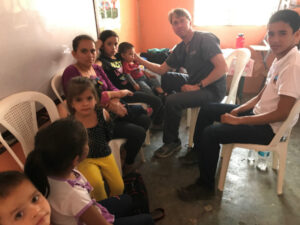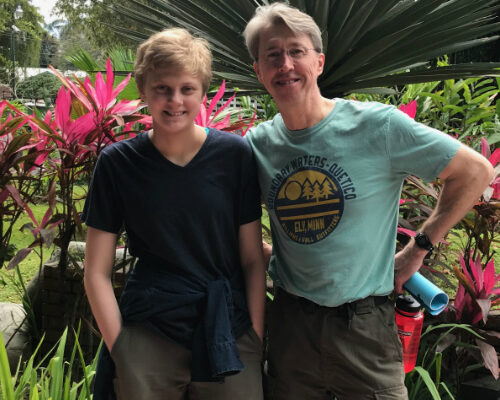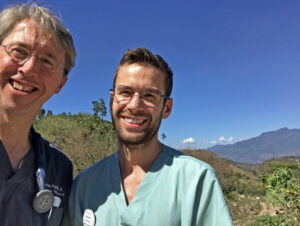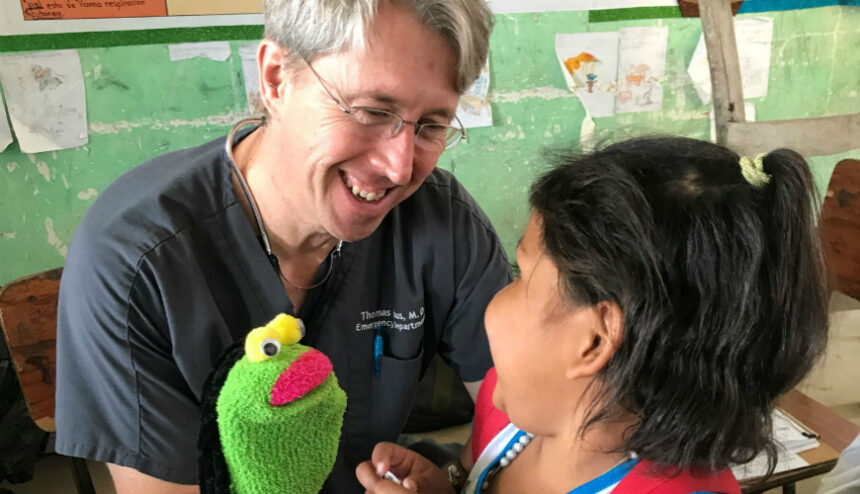Congratulations Dr. Thomas Haus on your recognition as a 2019 Community Caregiver; thank you for all of your care! Each year, Minnesota Physician Publishing recognizes physicians and health care providers who have volunteered their medical services. Whether volunteering at home or overseas, these caregivers help people in need and come away with a revitalized sense of their work. Their compassion, commitment, and generous spirit reflect the deeply held values in Minnesota’s medical community. Here is Dr. Haus’ full story.
After years of apprehension and the timing never seeming right, the burning desire for adventure and serving others won out. The timing was right and Dr. Thomas Haus decided to go for it. He was always impressed with the number of local community members who volunteer on the medical mission trips each year. He signed up with International Health Services (IHS) to go on the next trip to Honduras – and has since, been there four times.
Caring for Villagers in Honduras
Each February, approximately 150 people from all over the world arrive in Honduras and disperse throughout the country in 10-12 person teams. There are 1-2 doctors, 3-4 nurses, 2-3 pharmacists, an interpreter, and a communications person with a short-wave radio when cell coverage is not available. For dental care and teeth pulling, 1-2 Honduran dentists also join each team. Typically, the interpreters are local college students or bilingual team members.

Each team is out in the field for two weeks, visiting each village for a few days and then going to the next. They set up in a municipal building – an open shelter, a school, etc. with sheets hung up for patient privacy – and begin seeing villagers and their families. They look forward to the medical care and are lined up for hours, patiently waiting for their turn to be seen. When the team members are exhausted and it begins to get dark, the villagers return home for the night and line up again the next day.
Medical staff frequently diagnose and treat malnourishment, hypertension, diabetes, chronic wounds, and ocular conditions from sun exposure. If patients need further eye care, they can send them to centralized eye teams that are set up to help. While it is exhausting work, Dr. Haus said everyone they encounter is so grateful and caring.
Reflecting on how it felt after the first few days for him and so many others, Dr. Haus said reality set in. “You look at all of the people that are lined up, and they keep coming, are you really making a difference? Does what I’m doing really matter when there is so much need? It doesn’t take long to realize, yes, it matters to each and every individual you are helping. It really matters.”
Experience Provides Global View

The local Honduran Army provides security and Dr. Haus has always felt safe on the mission trips. From his own experience, Dr. Haus said it’s easy to live in your own little box, but there is so much more. On his last three trips, he has taken one of his four children along as a member of the team. Two of his three high school daughters who have gone were fluent in Spanish. Along with assisting at the clinics wherever they were needed, this skill was instrumental for communication.
His children have grown as young adults from the experience. He has seen them in action during the mission trip, and afterward, they feel grateful, empowered and self-confident. They realize the drama in high school isn’t that important in the big picture. They can think globally and recognize there is so much more to the world than what they know from growing up in a little town in west central Minnesota.
Dr. Haus often has a Rural Physician Associate Program student. Last year when he went to Honduras, his student, Daniel Harren, who also lived with Dr. Haus’ family, accompanied him and his daughter on the medical trip.
How Others Can Help Here at Home

In addition to volunteers, medical centers in Honduras always need equipment and supplies. Dr. Roderick Brown, a colleague of Dr. Haus’ at Glacial Ridge Health System has volunteered on numerous medical mission trips as well. They’ve worked with their local hospitals to get the equipment they are replacing or upgrading donated to hospitals in other countries that have none.
When the Rotary Clubs in Honduras find out the IHS teams are there, they cook for them and do what they can to help. Being a Rotarian himself, Dr. Haus and others met with local Rotarians and hospital staff last year to find out what equipment they need most. He is currently working on a grant through the Rotary International to purchase a ventilator for one of the hospitals, along with a service contract for sustainability. “They said they could save more lives if they only had a ventilator,” said Dr. Haus. “Imagine their priority needs compared to ours in the United States and at our own hospitals – yes, we’re definitely making a difference on mission trips – one person at a time.”
His 5th trip will likely be next year with his high school son.


